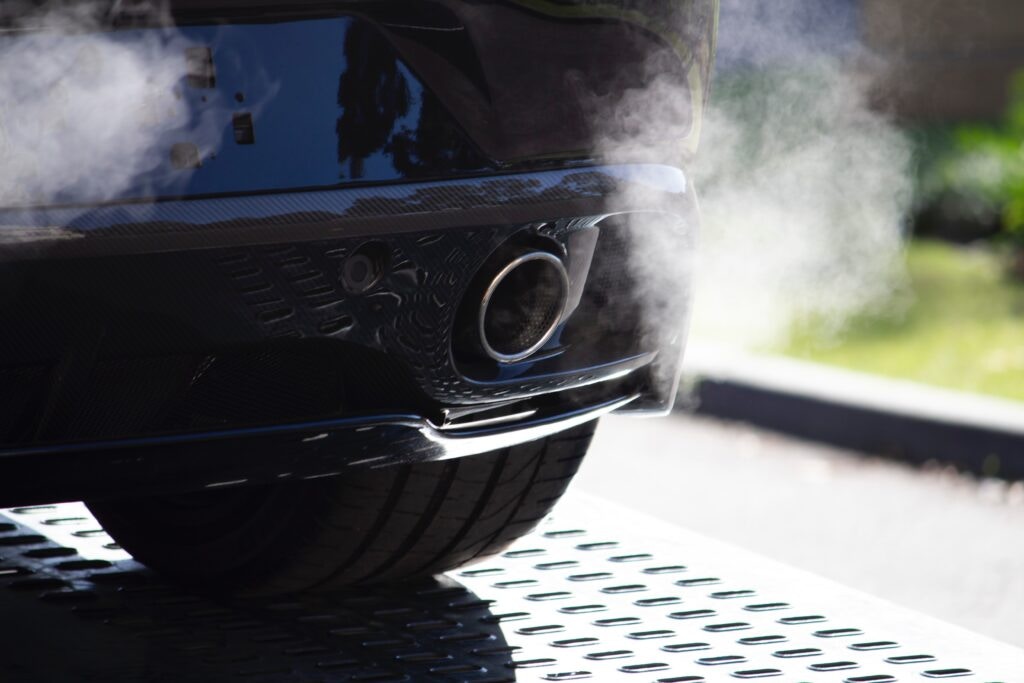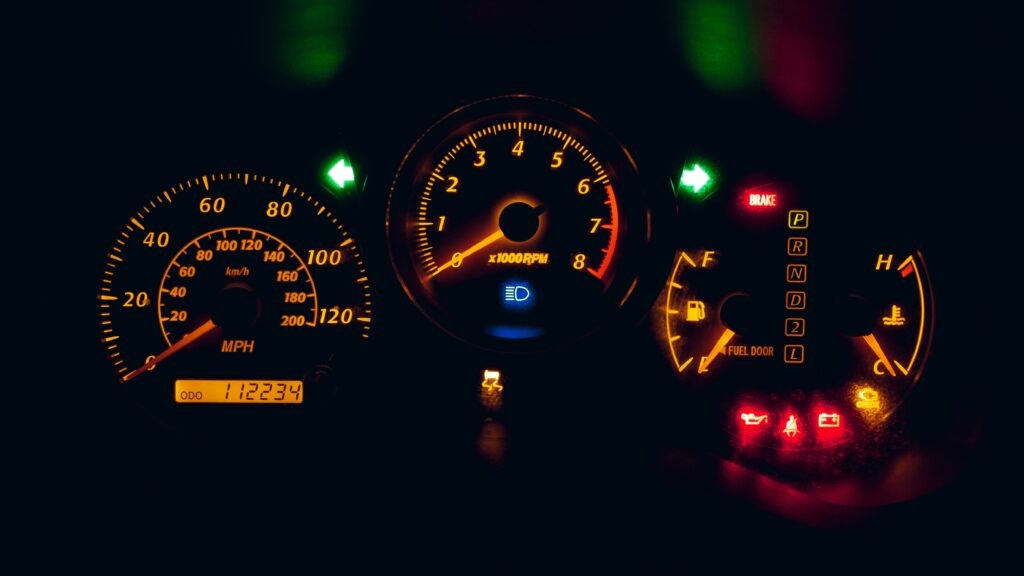What is AdBlue and how does it affect running costs?

AdBlue and other DEF solutions work by mixing with the hot car exhaust and converting pollutants into harmless by-products.
AdBlue is a brand of Diesel Exhaust Fluid (DEF), an additive used in some modern diesel engine vehicles’ exhaust systems to reduce harmful emissions.
AdBlue, and all DEF, plays a vital role in reducing pollution from diesel engines and is part of all diesel vehicles meeting Euro 6 compliance. If you have a diesel vehicle in the UK that was first registered after 2015, it more likely than not has an AdBlue cap right by the diesel cap when you go to fill it.
- How does AdBlue work?
- How to tell if your car needs AdBlue?
- Will AdBlue save me money?
- Is AdBlue worth it for cars?
- Can you combine AdBlue and diesel?
- How long does AdBlue last?
- Where can you buy Adblue for your car in the UK?
- Can any diesel car take AdBlue?
- FAQs

How does AdBlue work?
AdBlue reduces vehicle emissions by breaking down the harmful nitrogen oxides (NOx) that normally come through diesel exhaust into pure nitrogen and water. Although diesel engines have high fuel efficiency, their emissions aren’t healthy for drivers or pedestrians, and AdBlue helps diesel vehicles meet emission standards.
Whether you fill up your DEF tank with trademarked AdBlue or a generic brand, the substance is a standardised recipe mixture of urea and deionised water.
How to tell if your car needs AdBlue?
To determine if your car uses AdBlue, you can start by consulting your vehicle’s manual, which explicitly mentions whether your car is equipped with an AdBlue system. If that information isn’t readily available, look under the bonnet or around the fuel filler cap for a separate filler cap labelled ‘AdBlue.’
Some models these days have a major clue in the name, such as ‘Blue’ or ‘SCR’ featuring prominently, to highlight the fact that the exhaust is converting to reduce the harmful pollutants that the diesel car would otherwise emit.
Most compliant diesel cars use AdBlue, and so one way you can check is by entering your reg into Motorway’s free ULEZ checker.
Many AdBlue-equipped cars feature a dedicated warning light on the dashboard. When this light comes on, it’s a clear signal that the AdBlue level is low.

If you’re still unsure, contacting your car’s dealership or a qualified mechanic can provide a definitive answer and guidance on maintaining the AdBlue system.
Will AdBlue save me money?
AdBlue costs money to top up, however, keeping your new diesel cars emissions as clean as possible can indirectly save you money in several ways:
ULEZ and Clean Air Zone (CAZ) fines
In regions with strict exhaust emissions regulations, your AdBlue Euro 6 compliant vehicle will likely prevent you from having to pay any daily zone charges, or get issued with Penalty Charge Notices, which are worth hundreds of pounds.
Find out where the UK’s CAZs are to plan journeys ahead and avoid surprise charges.
Vehicle condition
By reducing harmful emissions, AdBlue can contribute to the longevity and health of your vehicle’s emission control systems, potentially reducing maintenance and repair costs.
Anything that improves your vehicle’s condition will keep your resale value strong – especially compared to similar models.
Is AdBlue worth it for cars?
Most cars using AdBlue or another DEF system don’t come with an alternative option. If you want to avoid the fuss of filling up AdBlue, you may prefer to look into a petrol or battery-electric vehicle and avoid any modern diesel cars or diesel hybrid engine vehicles.
AdBlue makes diesel engine vehicles much healthier to drive, for the owner as well as passers-by, other drivers and pedestrians on the road. It’s a crucial part of bringing modern diesel vehicles into line with emission standards.
Reducing the harmful pollutants that are emitted from diesel vehicles is essential for compliance, avoiding fines, and contributing to cleaner air.
Can you combine AdBlue and diesel?
Mixing AdBlue and diesel in either one of their individual tanks is extremely unsafe. If they combine, it can damage your vehicle’s engine and emission control systems.

AdBlue is designed for the exhaust system, while diesel fuels the engine. Mixing them can clog filters, cause engine damage, and lead to costly repairs. It’s crucial to avoid any contamination between AdBlue and diesel to ensure your vehicle’s proper operation and compliance with emission regulations.
How long does AdBlue last?
You should expect a car to be able to go at least 600 miles on a gallon of AdBlue. However, how far your AdBlue will take you varies depending on your vehicle’s fuel efficiency and the size of the AdBlue tank.
Look out for a warning light that pops up when your AdBlue is running low. Keeping an eye on your AdBlue level and topping it up when necessary is vital to ensure your vehicle stays environmentally friendly and complies with UK emission standards.
Where can you buy Adblue for your car in the UK?
| Where to buy AdBlue in the UK | Description |
| 1. Petrol and service stations | Purchase AdBlue at petrol stations, where it can be found to pump alongside the fuel. Alternatively, buy a bottle or container of it in the shop area. |
| 2. Garages | Find AdBlue in containers at garages that sell car parts and products. |
| 3. Supermarkets | Some supermarkets and big DIY chains sell AdBlue in their automotive aisles. |
| 4. Online retailers | Buy AdBlue online in a bottle or other easy-to-use container and have it delivered. |
Can any diesel car take AdBlue?
No, unless your car came with a DEF system in place, or has been retrofitted to have one, there won’t be an intake location for you to put AdBlue into your diesel engine car or van.
While it can be possible to re-power or retrofit a non-compliant diesel car to take AdBlue, you have to apply for and fund the certification that will allow you to drive it through charging emissions zones without paying charges and fines.
Swapping an engine to be ULEZ-compliant is rarely cheaper or easier than simply selling your non-compliant vehicle and purchasing a compliant one.
FAQs
How many miles should 10 litres of AdBlue last?
The mileage you can expect from 10 litres of AdBlue can vary depending on your vehicle’s AdBlue consumption rate.
On average, 10 litres of AdBlue can take a normal-sized car 600 to 800 miles. However, this is subject to a lot of variability, based on your vehicle’s fuel efficiency and your driving habits.
Are there different grades of AdBlue?
DEF is a standardised product with a specific composition, so there are no different grades or qualities of it, although AdBlue is the best-known. trademarked name for it. AdBlue, like all DEF, must meet international standards to ensure consistent quality and effectiveness in reducing vehicle emissions. For this reason, all DEF is made to the same recipe.
Can I mix AdBlue in diesel?
No, you should never mix AdBlue with diesel, with water, or anything else. AdBlue is an emissions-reducing agent used in the Selective Catalytic Reduction system of diesel vehicles. It is a clear, non-toxic liquid made out of water and urea. Mixing it with diesel will cause damage to your engine and emission control systems.
While AdBlue is a product you fill your diesel car with, it does not fuel the engine as the diesel does. It’s based in the exhaust system to convert pollutants into harmless byproducts of nitrogen and water.
What do I do if I put AdBlue in the wrong tank?
If you realise you have accidentally put AdBlue in your diesel tank and not in the AdBlue tank where the AdBlue filler cap is, you should keep the car turned off and call a roadside service to get the tank drained. Do not attempt to drive, under any circumstances, with the wrong substances in your car’s tanks. Depending on how much AdBlue you have put in will determine what sort of damage has been caused and ultimately whether or not the car runs.
What happens if my AdBlue runs out?
If your car model includes AdBlue, you should have a warning light on your dashboard that turns on when your AdBlue is low or empty. If your car has been retrofitted to have an SCR system, the mechanic who undertook your retrofit will have to explain how you can check your AdBlue levels and know to top them up when they run out.
You can easily refill Adblue yourself by using an AdBlue pump which is commonly used by truckers at fuel stations. You can also simply top up the car’s AdBlue by purchasing 10-litre AdBlue containers and then pouring it into your cars separate tank.
Will I damage my engine if I run out of AdBlue?
Running out of AdBlue won’t damage your engine, but it will affect your vehicle’s emissions and could lead to reduced performance and potential legal issues. When your AdBlue tank is empty, your vehicle might enter what’s called, ‘limp mode’, which limits engine power in order to encourage you to refill the AdBlue. You should also get an AdBlue warning light telling you your about to run out of AdBlue.
Your vehicle’s emissions will exceed legal limits while your AdBlue tank is empty, which can result in fines and non-compliance with emission standards if your pollution levels are recorded. While unlikely, it’s best to avoid this.
What is AdBlue made from?
AdBlue consists of a solution crafted from urea and water, and it is carefully stored in a designated tank within the vehicle. Urea is produced from ammonia and carbon dioxide and the mixture plays a crucial role in reducing harmful emissions, particularly nitrogen oxides through a chemical reaction, and is a vital component in modern vehicles equipped with selective catalytic reduction (SCR) technology.

How to track the value of your car?
If you’re not sure what your car’s value is to begin with, it’s hard to know what influence AdBlue has on the value increasing or decreasing.
All vehicles depreciate at varying rates, with no rule of averages accurately describing any one car’s changing value. Motorway’s Car Value Tracker provides a free, reliable monthly price alert for up to six vehicles at once.
Follow changes to your car’s value to choose the best time to sell, and make informed choices about investments in your car’s maintenance.
Selling your car?
Read about everything you need to know about how to sell your car with more guides here. There’s a lot to learn as Clean Air Zones and emissions standards in the UK change in the run-up to 2030.
- How to sell a car on Motorway
- Track the value of your car
- What is a Certificate of Conformity (CoC)?
- Top 10 tips for improving fuel efficiency
- Clean Air Zones (CAZ) in the UK – the 2023 guide
- ULEZ Frequently Asked Questions
- Should you sell your diesel car?
- Diesel emissions claims – the ultimate guide
- The 2035 ban on new petrol and diesel cars – the ultimate guide
The information provided on this page is for general informational purposes only and should not be considered as professional advice.